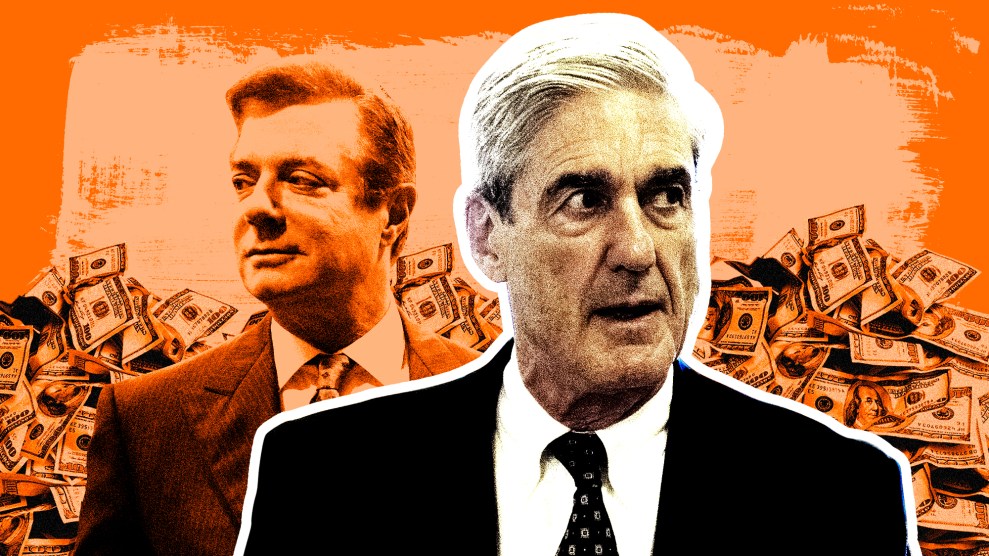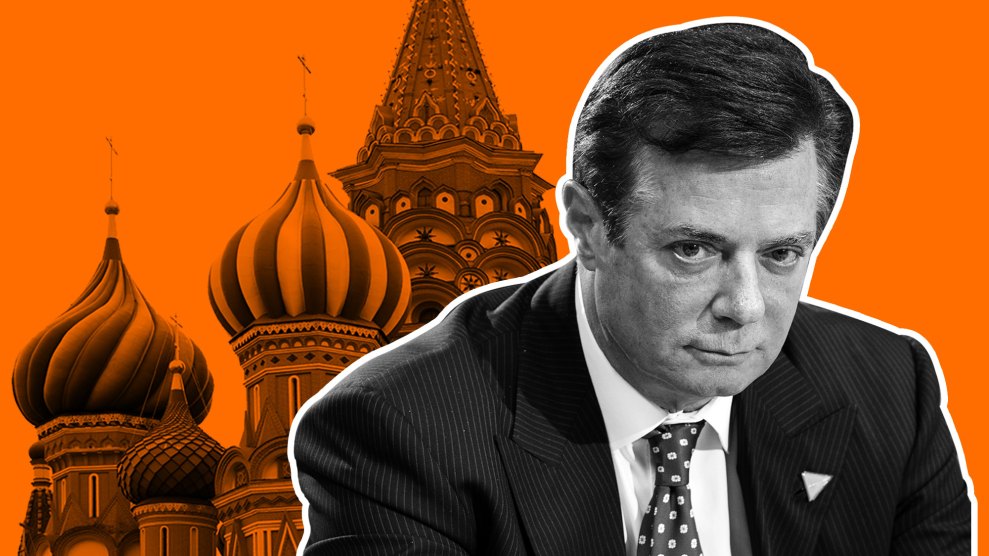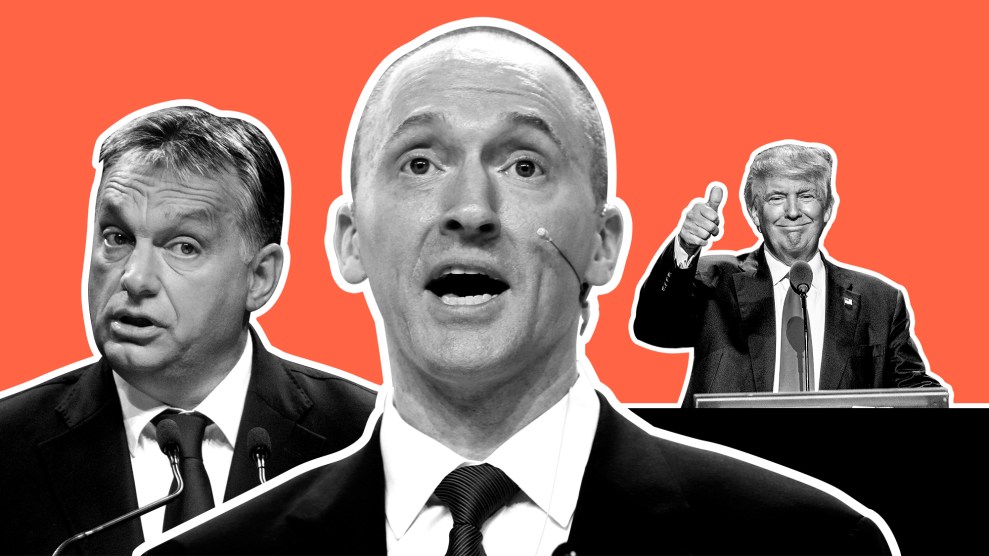
Mother Jones illustration
Late last year, as one of Paul Manafort’s attorneys argued over the terms of his client’s bail in a federal courtroom, he claimed that some of the key charges against Donald Trump’s ex-campaign chairman were nothing serious—a bureaucratic faux pas. “We look at it as just failing to file some forms,” Manafort’s lawyer, Kevin Downing, told the judge overseeing the case.
Manafort faces up to 80 years in prison on 12 counts that include conspiracy to launder money, fraud, and failure to report foreign bank accounts. But Downing suggested that Special Counsel Robert Mueller’s case rests on allegations that Manafort violated the Foreign Agents Registration Act, or FARA, a law that requires lobbyists for foreign interests to register with the Justice Department and submit regular, publicly available filings about their activities. Mueller’s charges stem from Manafort’s work for Ukrainian President Viktor Yanukovych, whom he represented from 2008 to 2014, when the pro-Russian strongman was deposed in a revolution. Manafort—who has spent much of his career promoting the interests of foreign despots—collected tens of millions of dollars in fees from Yanukovych and his party, but he never disclosed that lobbying work until he came under intense federal scrutiny last year. Downings’ comments suggested he thinks violating FARA, though it’s a felony, is no big deal.
He’s not alone.
Lobbyists for foreign governments have long treated the law dismissively. Many ignore it altogether. And those who do comply often tend to fall short of the law’s requirements. According to a report last year by the Justice Department’s inspector general, 62 percent of new registrants filed their documentation late. The IG also found that the majority of registrants filed incomplete reports that lacked such relevant details as the issues being lobbied on. Poor compliance with the law means that Washington’s thriving foreign influence industry operates largely in the shadows. But Mueller’s investigation into possible collusion between the Trump campaign and Russia has brought new attention to FARA and the nearly nonexistent policing of the law.
Manafort happens to be an opportune figure to highlight FARA’s deficiencies. Since the 1980s, he has been famous for working as a hired gun for some of the world’s shadiest regimes and autocrats, from Filipino kleptocrat Ferdinand Marcos to Jonas Savimbi, the leader of an Angolan rebel group accused of massacring civilians. Manafort used to register his activities, with dozens of filings in the FARA database since 1982, but he appears to have ceased filing under FARA in the late 1990s. Downing, Manafort’s attorney, did not respond to questions.
Along with Manafort and his business partner Rick Gates, who was also indicted, Mueller targeted former national security adviser Michael Flynn for FARA violations in connection with his 2016 lobbying work for a Dutch company that prosecutors say was a front for the Turkish government. As part of his November plea agreement, Flynn acknowledged that the government could prove he made false statements in a March 2017 FARA filing, when he stated he did not know the work primarily benefited Turkey.
A slew of recent articles has suggested that Mueller’s prosecutions are helping fix the freewheeling foreign influence industry. “‘A Toothless’ Old Law Could Have New Fangs, Thanks to Robert Mueller,” NPR pronounced. “Mueller Might Be the One Who’s ‘Draining the Swamp,'” the Washington Post reported. “How the Manafort Indictment Gave Bite to a Toothless Law,” said The Atlantic. But in interviews with Mother Jones, lobbyists who represent foreign governments and lawyers and scholars knowledgeable about the statute expressed skepticism that the “Mueller effect,” as some call it, will rein in foreign lobbying over the long term.
“I don’t know that what the special counsel is doing has a direct impact,” says William Minor of DLA Piper, an international law firm. “The regulations have not changed. The only thing that has changed is the attention paid to FARA and maybe the awareness of it.”
Indeed, Mueller’s investigation appears to have drawn attention to the law, leading to congressional hearings on the statute and increased efforts by the Justice Department to encourage FARA compliance. In its highest-profile move, the department forced the US offices of RT and Sputnik, Russian news organizations accused of serving as Kremlin mouthpieces, to register under FARA. Such efforts have caused many firms that represent foreign clients to review whether they are complying with the law.
From October 30, when Manafort and Gates were indicted, through February 1, 37 new firms registered under FARA, bringing the total number registered to 423. Companies and individuals already registered to act as foreign agents also disclosed 80 new “foreign principals” they work for—countries as well as foreign ministries, political parties, and foreign companies with government ties. That’s a noticeable uptick from a comparable period a year earlier, when there were 14 new registrants and 34 new foreign principals.
“The one thing that is different than before is that everybody is double-checking their work,” says Craig Engle, who runs the political law practice of Washington, DC-based Arendt Fox. “They have all picked up the phone and asked their lawyers the question, ‘Do we have a FARA obligation?'”
But those conversations alone won’t make the law work. FARA compliance is weak because the law itself is weak.
FARA was first enacted in 1938, in the run-up to World War II, as a means to expose Nazi propagandists. Congress amended the law in 1966 to focus it on foreign lobbying and altered it again in the course of passing the 1995 Lobbying Disclosure Act.
FARA requires lobbyists for foreign powers, or those creating materials to promote foreign interests, to disclose congressional and executive branch contacts. Every phone call and email should be reported. PR materials are supposed to filed online within 48 hours of their distribution.
The Justice Department’s FARA unit, which a department spokesman said currently has just nine employees, posts lobbying reports online and assists journalists and others who seek to review the documents. It is more like a library than a law enforcement unit.
“FARA is designed to promote disclosure, rather than proscribe conduct,” Deputy Assistant Attorney General Adam Hickey explained at a Senate Judiciary Committee hearing on the law in July.
The FARA unit doesn’t prosecute cases. In the rare instances when it discovers undisclosed foreign lobbying, often by employees reading news reports, the closest it gets to cracking down is sending a letter reminding the offender to register under FARA. Between 1966 and October 30, 2017, when Manafort and Gates were charged, the Justice Department brought only seven criminal FARA cases. (Three resulted in convictions on FARA charges, two in guilty pleas on other counts, and two in dismissed cases.) The unit can also conduct audits of FARA registrants to check if they are complying. But the Justice Department’s inspector general found such audits are infrequent.
With little to fear from the FARA unit, foreign lobbyists often skirt the law, either by not registering or by taking refuge in loopholes, including one opened by the 1995 Lobbying Disclosure Act (LDA). The law aimed to bring more transparency to the lobbying industry, but it weakened FARA. It gave FARA registrants the option of registering instead under the LDA if the “principal beneficiary” of their work was not a foreign government or political party. The LDA requires lobbyists to file disclosures with Congress that include far less detail about their work than FARA does. FARA registration has fallen by about one-third since 1995.
Due to the LDA loophole, many lobbyists advocating on behalf of foreign interests in Washington don’t register under FARA. One example: In 2014, former Sens. Trent Lott and John Breaux, now both at the law firm Squire Patton Boggs, lobbied against sanctions targeting Russia on behalf of the country’s state-controlled Gazprombank. Though the bank’s position mirrored a major Russian foreign policy goal, the senators registered under the LDA, not FARA.
Richard Burt, who helped write an April 2016 foreign policy address in which then-candidate Donald Trump called for closer relations with Russia, pocketed hundreds of thousands of dollars in lobbying fees advocating a pipeline, known as Nord Stream II, that Russia’s state-owned oil giant Gazprom controlled. He, too, registered under the LDA, allowing him to withhold disclosure of his government contacts.
Mueller’s investigation has spotlighted other tactics that lobbyists and their clients use to sidestep the law, including by setting up foreign or domestic nonprofit groups and other middlemen to mask the true identity of their clients. Manafort promoted the agenda of Yanukovych, whom the Kremlin considered an ally, by creating what prosecutors say was a bogus nonprofit, the European Centre for a Modern Ukraine. Manafort arranged for two prominent K Street firms—Mercury Consulting, a Republican-leaning shop, and the Podesta Group, a Democratic-leaning outfit—to lobby in Washington, supposedly on the center’s behalf. The setup allowed the lobbyists to report scant details of their work under the LDA. Officials from both firms face scrutiny from Mueller. The Podesta Group collapsed as a result of the special counsel’s probe.
Mercury has also been linked to another nonprofit suspected of fronting for a different Balkan nation. In early 2017, the firm registered the Libertas Foundation, an organization with no website, and claimed as its address an accounting office in Brooklyn’s Brighton Beach neighborhood. Mercury’s lobbyist on the account was former Louisiana Sen. David Vitter. Mercury first filed under the Lobbying Disclosure Act and then, in February 2017, under FARA. But its FARA filings still seemed to mask the real client. According to the the Organized Crime and Corruption Reporting Project, an international anti-corruption group, Libertas was doing the bidding of Macedonia’s ruling party, known as VMRO-DPMNE.
Flynn, too, is accused of obscuring his real client. He claimed he was hired in August 2016 by Inovo BV, a Dutch consulting company, to assist the firm’s work for an Israeli firm that wanted to export natural gas to Turkey and needed advice on US-Turkish relations. Prosecutors say that claim was false; Flynn was really working for the regime of Turkish President Recep Erdoğan.
In 2016, a nonprofit called the Human Rights Accountability Global Initiative engaged in lobbying aimed at opposing expansion of the Magnitsky Act, a 2012 law sanctioning Russians accused of corruption or human rights abuses. The group, nominally based in a shared office space in Washington, claimed to be focused on ending the Russian ban on adoptions imposed in retaliation for the Magnitsky law. The organization was run by Rinat Akhmetshin, a DC lobbyist and former counterintelligence officer in the Soviet military, and it employed Russian lawyer Natalia Veselnitskaya. Both attended the 2016 Trump Tower meeting where Donald Trump Jr. was told a Russian government emissary would provide him with dirt on Hillary Clinton. The group was funded by wealthy Russians with ties to Petr Katsyv, deputy director of Russian Railways, and Mueller along with the Senate Intelligence Committee are reportedly probing whether it is a Russian government front organization.
Several foreign lobbyists say they face pressure to agree to take-it-or-leave-it arrangements with foreign clients shopping for a representative who doesn’t register under FARA or ask many questions about the real interest behind a holding company seeking help on an influence campaign in Washington. Often deals are arranged through people who function, as Manafort did, as fixers who connect foreign parties to DC lobbyists who may remain partly in the dark about the real client’s agenda and identity.
Those DC firms may suspect that their real employer is a foreign government, but they face a strong financial incentive not to press the question.
“It’s hard to tell sometimes if you’re being lied to or not,” says former Rep. Connie Mack, a Florida Republican who represents Hungary’s nationalist government and other clients in Central and Eastern Europe. Mack says he’s walked away from clients he suspected were misleading him. But, he adds, “in some cases you ask the question—you do all the right things and find out later that you’ve been lied to.”
Many of the ways that lobbyists or their clients avoid complying with FARA could be eliminated under prospective legislation. Senate Judiciary Committee Chairman Chuck Grassley (R-Iowa) has proposed a bill that would eliminate the exemption that allows lobbyists for foreign companies to avoid FARA by filing under the Lobbying Disclosure Act. Similar legislation passed the House Judiciary Committee last month. A bill introduced by Sens. Tammy Duckworth (D-Ill.) Dick Durbin (D-Ill.) and Richard Blumenthal (D-Conn.) would boost the Justice Department’s power to fine FARA violators.* It and would also eliminate the exemption targeted by Grassley’s bill.
But those proposals have yet to receive a full vote in either congressional chamber. And without changes to the law, FARA experts predict the Mueller effect will fade away with his probe.
“Once his investigation is complete, those resources will be gone,” says Ben Freeman, who studies FARA at the Center for International Policy. “FARA enforcement will then go back to being what it was before—almost nonexistent.”
Image credit: Ron Sachs/CNP/AP; Matt Rourke/AP; choness/Getty
Clarification: This article has been updated to better describe legislation proposed by Senators Duckworth, Durbin and Blumenthal.
















